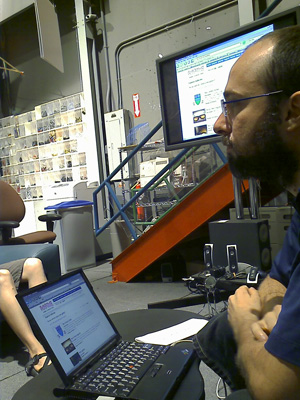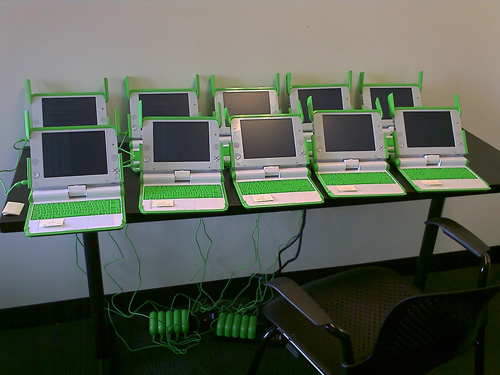By Ismael Peña-López (@ictlogist), 24 July 2007
Main categories: Digital Divide, ICT4D, Meetings, Participation, Engagement, Use, Activism
Other tags: sdp2007
No Comments »
- How do residents connect with each other to create and maintain social networks?
- How can technology dbe degisned to neotiate a balance between the opportunitiews of interactive services vs. identity, trust and privacy?
- What is the role of content?
What’s community? Social network, urban village, swarm, neighbourhood, me and my friends… Have something in common?
Shift from the “little boxes” model to personalized social networks: more permeable boundaries…
Urban tribes: swarms of interconnected friends, filling the gap between college and married life, fluidity of social networks, place and proximity matters.
Communicative Ecology
- Discursive layer
- Social layer
- Technology layer
global vs. local; collective vs. individual; online vs. offline
Community as Collective vs. Community as Network
- interest in the community vs. interest in the individual
- community activism vs. personal, social networking
- public vs. private
- many-to-many vs. peer-to-peer switchboard
- formal discussion vs. informal chat
- asynchronous vs. synchronous
- permanent vs. transitory
- hierarchically structured vs. networked to the “edge of chaos”
- discussion board, mailing lists vs. instant messenger email, SMS
- Gemeinschaft vs. Urban Tribe
| |
collective interaction |
networked interaction |
| geographically dispersed |
online communities |
online social networking (e.g. MySpace, Facebook) |
| place based |
collective interaction for discussion about place |
networked interact for sociability in place |
Connectivity does not ensure community. If you build it, they will not necessarily come. On the other hand, social capital rich communities are likely to progress and also to have a preference for “social isolation”.
Readings
More info
SDP 2007 related posts (2007)
By Ismael Peña-López (@ictlogist), 22 July 2007
Main categories: Connectivity, Digital Divide, Digital Literacy, Education & e-Learning, Hardware, ICT4D, Meetings, Open Access
Other tags: sdp2007
2 Comments »
We’ll never thank Chintan Vaishnav enough for arranging our visit to the MIT Media Lab and OLPC Foundation, impressive places where to work (or study, of course: actually, a place to learn, either official role you get there with), really interdisciplinary.
MIT Media Lab
We visited Lifelong Kindergarden research group, which has Lego as main founder, and Lego Mindstorms as one of Lego-MIT Media Lab most interesting outcomes.
 Jay Silver
Jay Silver
We there were presented a couple of very interesting projects:
Scratch
Jay Silver kindly introduced us to the rudiments of Scratch and how to get started on this tool. Actually, I still wonder whether it is a game, a multimedia design and production tool, an educational technology, a collaborative web 2.0 networking social software or all of them.
I’m pretty sure that Jay Silver was right when he said that tools the like of Scratch actually fit on what Ivan Illich wanted to state on Deschooling Society.
What’s Up
It then was turn for Leo Burd’s thesis Technological Initiatives for Social Empowerment: Design Experiments in Technology-Supported Youth Participation and Local Civic Engagement, most commonly known as What’s Up.
The project joins best of both worlds in VoIP, mobile telephony and social software for community building. The idea is that while the Web is quite spread, in most developing countries the ICT revolution is clearly led by mobile phones. Thus, What’s Up presents the usual community site but empowered with VoIP and all kinds of mobile enhanced features, just like SMS posted text and vodcasts.
One Laptop per Child Foundation
 XO Laptop (AKA “OLPC” Laptop)
XO Laptop (AKA “OLPC” Laptop)
It is actually relevant that our visit at One Laptop per Child Foundation was lead by Samuel Klein, director of content of the One Laptop per Child Project.
A year and a half ago I wrote Negroponte and the Web 2.0 or the Four Classes of the Digital Divide to state that Nicholas Negroponte’s effort to bridge the digital divide will be worthless if digital literacy and provision of content and services did not accompany the infrastructures revolution and diffusion. Having Samuel Klein as spokesman or PR representative makes a tacit statement on what the One Laptop per Child Project is about: it is not about delivering laptops to children, is about opening them the gates of content, which is the real issue.
As he himself explained, every activity has comunity around it, being the goal to build education networks, an example of it the installation of Moodle for some community projects, being the management and coordination of this free software LMS done by the same educational institutions that provide wireless connectivity to the laptops.
The commitment with content can be on the other hand exemplified with the Summer of Content 2007 initiative to provide content to be packeted with the XO laptop.
Samuel Klein strongly encouraged the audience and anyone interested to both contribute to the OLPC Project Wiki and subscribe to the OLPC Project Wiki mailing lists.
More info
SDP 2007 related posts (2007)
By Ismael Peña-López (@ictlogist), 28 June 2007
Main categories: ICT4D, Meetings
No Comments »
As I already announced, next August 30th and 31st 2007 the Second Annual ICT4D Postgraduate Symposium will take place at Karlstad University (Sweden). If you’re doing research in this field and can somehow manage to attend the meeting, this is an absolutely not-to-miss gathering.
I’m planning to be there and present a communication named Unpeeling the layers of the digital divide: category thresholds and relationships within composite indices, which is the evolution or follow-up of the one presented last year: The e-readiness layers: thresholds and relationships.
By Ismael Peña-López (@ictlogist), 27 June 2007
Main categories: Digital Divide, Digital Literacy, ICT4D
No Comments »
The results of the Project Internet Catalonia, directed by , were presented yesterday at the Open University of Catalonia headquarters. Actually, it was just a formal presentation, as the [reports] are to be made public and available to everyone […] between October 2007 to January 2008.
Nevertheless, professors Castells and Imma Tubella, directors of the project, gave some highlights of their (40 researchers were involved) main findings.
Under my point of view — and own interests, of course — there are two important statements that would explain both successes and failures in the field of Information and Communication Technologies for Development, digital (il)literacy, and digital content and services use:
The study shows that the more independent and capable people are in developing projects, the more they will use the internet. And the more they use the internet, the more autonomy they can achieve.
- The Internet
[…]requires some educational level
, because we live in an uninformed Information Society, and this will not be solved by the Internet
. The Internet deepens a historical divide: the educational
: It is not just a matter of access, but to receive the appropriate education to know what for and how to use the Internet
Put short: ICTs are catalysts and multipliers. Capable people — and developed countries — will find an amazing tool to boost their abilities and the reach and scope of their energies. Illiterate will enter new — digital — illiteracies that will make them opt out of something they don’t understand or find useful at all, widening the gap of their illiteracy, unpowering — impoverishing — them.
Hence, the role of education is more important than ever — let aside health and economic development, of course — and the teaching staff is the key element in the incorporation of the internet into school education
, but the scenario is quite sad:
the presence of internet in the classroom is very low in comparison to the use made of it by teachers and students outside of school
the majority of computers with an internet connection were to be found in the computer studies classrooms to which students had much less access than they did to their own classroom
until very recently teachers tend to use the internet to maintain the traditional teaching patterns, rather than trying to use it to innovate
a good number of school directors do not prioritise the integration of ICT and the internet for educational ends
This is something I wrote about in my post Nativos Digitales [Digital Natives — post in Spanish] at the Educación y Cultura [Education and Culture] blog, were I stated that:
It’s likely that one of the steps we have to make, as teachers — but also as parents, as education begins (or should begin) at home —, is accelerating our “nationalization” in the digital world: we’ll always have the accent of our mother tongue, but only by speaking in the same language understanding will become possible. And, let’s face it, digital natives will not learn a dead language, ours, the one of letters and mail, phone calls, or incunable facsimile editions with yellowish pages.
By Ismael Peña-López (@ictlogist), 14 June 2007
Main categories: ICT4D, Writings
No Comments »
The Council of Science Editors is organizing a Global Theme Issue on Poverty and Human Development in October 2007. Science journals throughout the world will simultaneously publish papers on this topic of worldwide interest – to raise awareness, stimulate interest, and stimulate research into poverty and human development. This is an international collaboration with journals from developed and developing countries.
ICTlogy, the review of ICT4d (ISSN 1886-5208), will be joining the initiative.
Thanks to Francisco Lupiáñez, for pointing me to the original piece of news, and to Jeni Reiling, for kindest attention.
More info
By Ismael Peña-López (@ictlogist), 08 June 2007
Main categories: ICT4D, Meetings, Open Access, Writings
1 Comment »
My proposal for a thematic showcase for the Web2forDev – Participatory Web for Development conference has been accepted. Thus, I’d be presenting The personal research portal: web 2.0 driven individual commitment with open access for development in Rome next 25th to 27th September, 2007.
As you might have noticed, this communication is quite similar to the one I’ll be presenting in York three weeks before. But, even if the abstract applies for both presentations, the focus is quite different.
In York the focus will be on research and diffusion of research. So, the stress will be, in one hand, in scholarly networking and old and new ways of knowledge sharing and building among colleagues. On the other hand, and over all, the stress will be put in self-archiving and self-publishing as parallel ways of scientific diffusion, dealing also with old and new ways of peer review. Put short: I’ll speak about the concept over the tools.
In Rome the focus will be on open access for development. There, the stress will be on new ways to access scientific knowledge by developing countries’ researchers and, reversely, on digital identities, networking and presence on the Net by these researchers. Put short: I’ll speak about the tools over the concept.
On one hand I’m afraid I won’t be able to explain really brand new things from one conference to the other one — they’re just 20 days away one from each other. On the other hand, I believe there is so much to be explored in the field of web 2.0 and how these concept and tools can be applied to research and development (a different thing?), that the potential debate will provide what I might be lacking of, hence I expect to come back home full of new learning, ideas and interesting input.
Update:
Eric Gundersen will also attend the conference, presenting
Portal 2.0: Using Social Software to Connect Geographically Dispersed Teams, which seems to have a pretty similar approach to my paper. Shouldn’t miss it! :)



